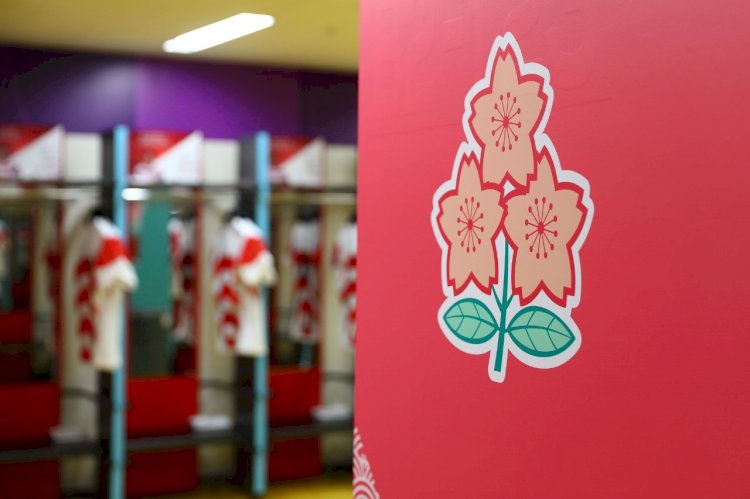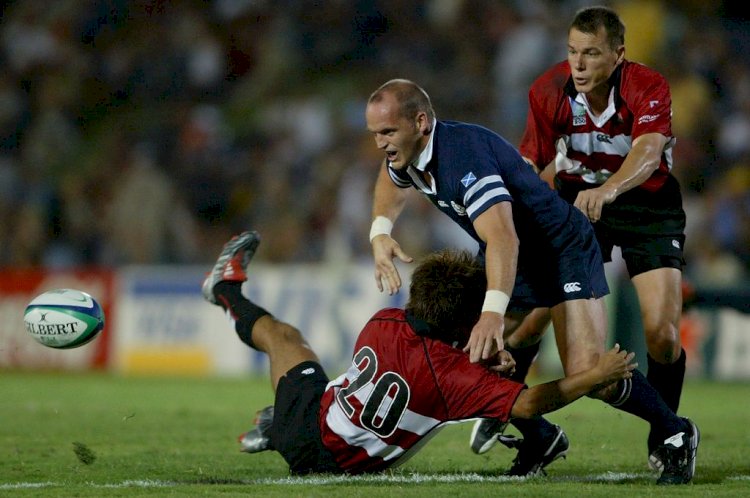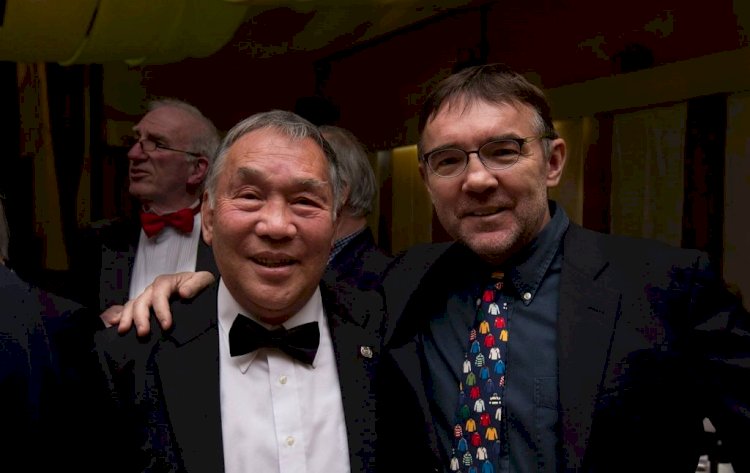How Cherry Blossoms Became Brave Blossoms - Against Scotland
"After the game I was talking to Mark Bell, one of the coaches, about what a brave performance it had been for 60 minutes," says Rich Freeman, an English rugby journalist who has been based in Japan for more than 20 years.

It is 21:15 on 12 October, 2003, at the Dairy Farmers Stadium, Townsville, Queensland, Australia. Winger Hirotoki Onozawa has just finished off a flowing first-phase backs move by scoring in the corner and Japan are within four points of Scotland with 23 minutes of the match remaining.
It was not to be for the team known as the Cherry Blossoms. Late tries by Chris Paterson, Simon Taylor and Simon Danielli helped the Scots to a flattering 32-11 victory – but it became a red-letter day for Japanese rugby.
Despite enjoying only 17 per cent of possession, the Blossoms were more creative and entertaining than their Tier 1 opponents, and could have scored twice in the first half as their midfield punched holes in the Scottish defence only for last-ditch tackles on Onozawa and Daisuke Ohata on the opposite wing to deny them the five-pointers.

Along with their characteristically cavalier attack, Japan demonstrated a hitherto-unseen steel in defence, attempting 168 tackles and making 136 of them.
While RWC 2003 did not mark a complete change in fortunes for Japan – they struggled to make their mark until they beat South Africa at the 2015 tournament - one thing that did change in Townsville was the public’s attitude towards the team, and their nickname. The Cherry Blossoms were now the Brave Blossoms.
"After the game I was talking to Mark Bell, one of the coaches, about what a brave performance it had been for 60 minutes," says Rich Freeman, an English rugby journalist who has been based in Japan for more than 20 years.
"A lot of the journalists were talking about ‘Brave Blossoms’ and one of the local papers used it in a headline. I used it in my copy for the Japan Times.
"At the time Japan didn’t really have a nickname. ‘Cherry Blossoms’ was their English nickname but in Japan they were either called ‘Mukai Japan’, after then-coach Shogo Mukai, or people talked about ‘the Sakura jersey’.
READ ALSO:
On-Song Samoa Aim To Go Out On A High Note
Ireland Out To Restore Confidence And Book Last-Eight Spot
"So from 2003 I started using ‘Brave Blossoms’ every now and again to break up the copy rather than just ‘Japan, Japan, Japan’ and I stuck with it."
"The Japan RFU weren’t very happy at first and didn’t like it being used. I used to write the English-language pages on their website and they would always take it out and replace it with ‘Japan’."
"But in 2009 the Classic All Blacks were over and Andrew Mehrtens used it in the post-match interview in front of the whole crowd in Kobe.
“The JRFU thought ‘Maybe this nickname isn’t such a bad idea’, and since the win over South Africa they’ve really marketed it. Now we’re seeing ‘We are Brave Blossoms’ in the street, on shirts and everywhere."

Freeman, who originally came to Japan to coach rugby before forging a successful career in journalism, even has academic evidence of the provenance of the term.
"The son of Yoshihiro 'Demi' Sakata, Japan’s hall of fame winger (pictured above with Freeman) wrote a thesis for a New Zealand university and in the footnotes there’s a mention about how they were known as the Brave Blossoms from 2003 - according to Rich Freeman!"
As well as marking the change of sobriquet for the national side, Freeman says that the Townsville matches – in their second defeat they trailed France only 20-19 after an hour - marked a turning point for Japanese rugby.
"It was when they started to get a little bit of self-belief. Obviously 2007 (no wins) was disappointing after 2003. And at RWC 2011 they played France again at North Harbour and after 60 minutes were four points down but it ran away from them.
"Then in 2013 the win against Wales (Japan beat the Six Nations champions 23-8 in Tokyo) was the one when they finally put it all together and beat a Tier 1 nation. And then came South Africa…"
The Blossoms, he says, will have to be at their bravest if they are to create World Cup history by reaching the quarter-finals on Sunday, a match in which Japan’s 2003 prop Shin Hasegawa and Scotland’s Gregor Townsend, pictured top, will be crossing swords as scrum coach and head coach for their respective nations.
"It’s going to be tough. I think the nerves will get to Japan. Scotland have played some brilliant rugby and they’re going to be fired up," he says of the final Pool A match at Yokahama.
"It would be good for the tournament and the country if Japan went through. They play a good brand of rugby and everybody likes watching them."
As for Freeman’s contribution to the Japan rugby brand, he is happy to share it with the rugby world.
"At the end of the day if someone wants to use it they’ll use it," he says. "Saying that, I wish I had a yen for every jersey sold."





































